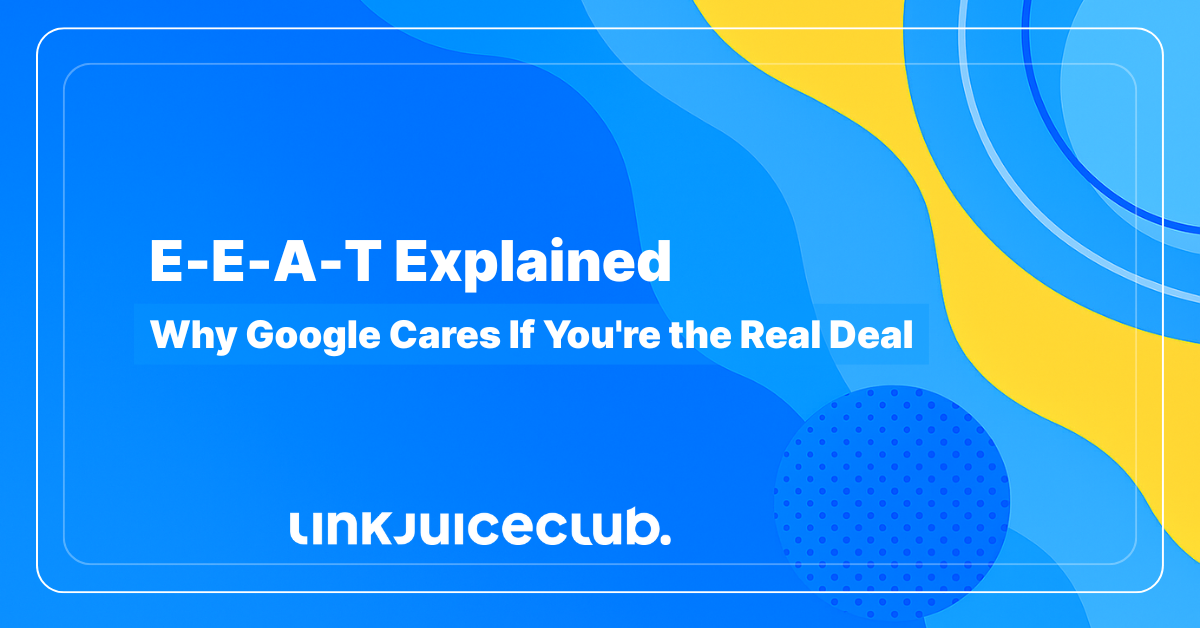
E-E-A-T Explained: Why Google Cares If You’re the Real Deal
Google doesn’t just want content, it wants credible, high-value content written by people who know their stuff. That’s where E-E-A-T enters the chat. No, it’s not a typo. This four-letter framework is Google’s way of sniffing out legit content from the fluff-filled chaos of the internet.
So, what does E-E-A-T actually mean? It’s short for Experience, Expertise, Authoritativeness, and Trustworthiness.
But don’t worry, you don’t need a lab coat or a PhD to pass the E-E-A-T test. What you do need is a clear strategy that shows you know your stuff, have walked the walk, and can be trusted to deliver real value to your readers.

And if you do that right? Google rewards you with what we all want: visibility, credibility, and juicy organic traffic.
Wait, What’s with All the E’s?
First, there was E-A-T. Then Google decided to supersize the acronym by tossing in another E for Experience. That happened in 2021, and by 2022, Google confirmed that this upgraded E-E-A-T model was being applied to every single search query.
Translation? If you’re publishing anything online, Google’s judging your work harder than a food critic at a truck stop.
Experience, Expertise, Authoritativeness, and Trustworthiness, this is the blueprint Google’s quality raters use to separate the gold from the garbage. Straight from the official Search Quality Raters’ Guidelines, Google practically says: Wanna win in search? Learn how our raters think. And if that’s not a subtle nudge to level up your content game, we don’t know what is.
The Rise (and Reign) of E-E-A-T
Back in 2014, E-A-T made a sneaky debut when Google’s internal guide was leaked like a plot twist from a bad TV drama. But by 2020, it became canon. And now? It’s one of the top three things Google considers when sizing up your site’s Page Quality.
So yeah – it matters. A lot.
If you’re not baking E-E-A-T into your content yet, consider this your neon-flashing wake-up call. Because at Link Juice Club, we’re not just fans of E-E-A-T; we help you serve it hot with content that checks all the boxes and backlinks that scream credibility.
The YMYL Drama
Now things get serious. Enter Google’s Your Money or Your Life (YMYL) label, pages dealing with health, finances, safety, or life advice. Basically, anything where bad info could ruin someone’s day (or life).
Think:
- A health site diagnosing rare diseases
- A financial blog telling you what to do with your savings
- A parenting post dishing out baby-care hacks
- An online store asking for your credit card
In these cases, Google holds your content to a higher standard. If you’re giving life-altering advice, you’d better back it up with proof, credentials, and some rock-solid E-E-A-T. Because guess what? The algorithm doesn’t just want to serve results, it wants to serve safe, smart, and helpful results.
How to Actually Nail E-E-A-T Like a Pro
So, you’re ready to flex your SEO muscles and impress both Google and your readers? Good.
But before you dive into optimization mode, you need to understand what makes E-E-A-T tick.
Show, Don’t Tell: The Value of Real Experience
Google’s not here for your hypothetical takes. It wants proof that you’ve actually been there, done that. Whether you’re reviewing gear, offering travel tips, or sharing parenting hacks, your content needs to come from someone who’s lived it (not just Googled it).
To show off your real-world chops, start weaving in personal stories and concrete examples.
The more human your content feels, the more trustworthy it becomes. both to readers and Google’s quality raters.
Bring the Brains: Flaunt Your Expertise
If you know your stuff, now’s the time to prove it. Expertise means showing the depth of your knowledge in a way that’s clear, accurate, and helpful.
For YMYL content, this means involving actual professionals with the credentials to back it up. For everything else, it’s about producing content that’s clearly well-researched and bursting with insight.
Add author bios that highlight relevant skills, degrees, and accomplishments. Make your content the go-to source by being comprehensive, and always, always back up claims with solid sources.
Own the Room: Build Your Authoritative Reputation
Being an authority is about being the name people trust and reference in your niche. If respected sites are linking to your work, if influencers are quoting you, or if customers are shouting your praises, then congratulations, you’re on your way to being the expert Google wants to showcase.
To boost your authority, focus on getting featured where it matters: high-authority websites, niche podcasts, reputable blogs, and respected media outlets. Chase those juicy backlinks and showcase testimonials from credible voices.
Trustworthiness Is the Real MVP of E-E-A-T
You can have all the experience, authority, and expertise in the world, but if your website is shady, nobody’s sticking around, including Google.
Trustworthiness in the world of E-E-A-T is about making people feel safe, informed, and not like they’re wandering into a sketchy alley of the internet. It covers everything from having a secure site to being upfront about who you are and what you’re doing with people’s data.
Want to level up your trust factor? Start with the basics. Make sure your site is locked down with HTTPS.
Also, a proper About page, clear contact details, and straightforward policies (returns, privacy, shipping) show you’re not hiding anything. And if you’re doing affiliate marketing or publishing sponsored content, say it loud and proud. Transparency builds credibility, and credibility builds rankings.
E-E-A-T Is Part of Your SEO Lifestyle!
E-E-A-T isn’t some one-and-done to-do list you can tick off between coffee breaks. It’s a long-term game of credibility, consistency, and actual value.
When you consistently create content that reflects real-world experience, flaunt your expertise like it’s fashion week, build genuine authority, and earn trust like a digital saint—you’re building a brand people believe in.
In short, E-E-A-T is your compass in the SEO wildlands.





